Twice Born – Yoruba Ibeji Twin Figures
PRIMITIVE - Friday, July 15, 2016By Misaki Imagawa
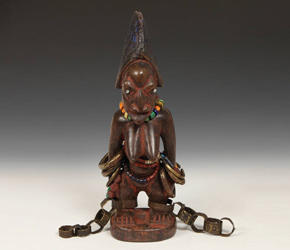 |
|
In the early 1900s, a couple embarked from their home in London to travel south into the heart of Africa. Their friends and relatives called them crazy and eccentric, even deranged, but they always had pity and sympathy in their voices. It was understandable. The couple had just suffered the tremendous loss of twins during child birth. Laura, the mother, had barely survived; and even after her long recovery her heart remained shadowed. Her husband, Frank, an oil engineer doing business all over the world, organized the trip in the hopes of bringing back his cheerful, headstrong wife. An adventure might serve them both well.
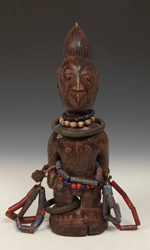 |
|
So they set sail in a ship loaded with traders, anthropologists, adventurers and military men, cruising for days along the shorelines of Europe, and then around the western coast of Africa. At long last they landed in Lagos of present day Nigeria where Frank’s colleague welcomed them. Over the next few weeks, they immersed themselves into bizarre worlds of bewildering ceremonies, divination, customs, artworks and cuisines. Slowly, day by day, life began to seep back into Laura’s eyes and expression. Then one day during a trip north of the city they encountered a tribe called the Yoruba.
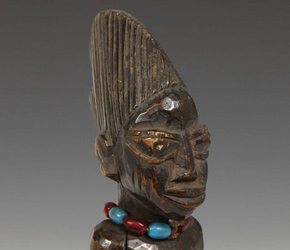 |
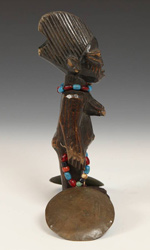 |
|
At first they thought nothing unusual of the people they passed by in the fields, but then Laura started noticing something peculiar. “What are those dolls the women are carrying?” she asked. Some women were also carrying babies along with a single doll, but others only had two dolls. Some young girls and even boys were also holding a doll each, carefully wrapped in cloth and tucked close to their bodies. “Ere Ibeji,” their guide told them. “They are the souls of lost twins.” Emotions welled up in Laura. Grief and loss once again came to the forefront of her mind and her eyes brimmed with tears. Distressed, Frank immediately suggested they turn back, but Laura refused. They approached a nearby village and though the people were wary of foreigners, they sympathized with Laura’s loss and accepted them into their homes. The couple spent days with the tribe and with the help of their guide, learned all about the sacred tradition of Ibeji twin figures.
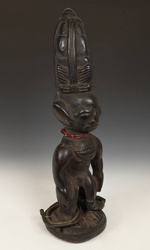 |
|
The Yoruba people have historically been known to have a high rate of twin births; the highest in the world. Statistics today show that 44 out of every 1,000 births are twins. Both diet and genetics contribute to this occurrence, though some consider it a gift from God. However, in ancient times twins were seen as bad luck and barbaric because only animals gave birth to multiple offspring. The mother would be branded as immoral because it was thought she must have slept with two men to conceive two babies. It was not uncommon for twins to be taken from their mother and buried alive (Laura and Frank, upon hearing this, exchanged horrified looks). Then one day, as stories go, a Yoruba woman gave birth to twins in a village where the people did not consider them evil. The twins brought the mother sympathy, wealth, and eventually even the blessings of the Oba, the Yoruba king.
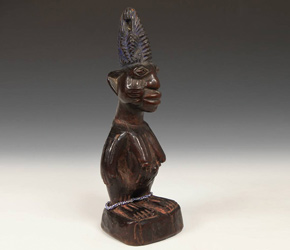 |
|
Since then, twins have been seen as harbingers of good fortune, wealth, abundance and happiness. They were elevated to the title of Orisha, deities who are less than God but greater than humans. Both twins are considered one Ibeji; a single soul sharing two bodies. They are sacred by birth and if one or both babies die, it is crucial that a ceremonial figure is made for the Ibeji soul. Some Ibeji figures take days or even weeks to be created, going through many rituals and carved with great detail and skill. Though the figures represent infants who have passed, the carvings depict them as adults in the prime of their years. The boys stand with broad chests and powerful shoulders while the girls have full, well-developed breasts, each representing the strength, vitality and fertility of the Ibeji.
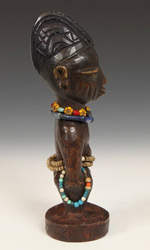 |
|
Once the parents receive their Ibeji figures they treat them just as they would a real infant. The mother carries it with her wherever she goes and gives it constant attention. It is fed, bathed, rubbed with oils and caressed. Many are also clothed; if the other twin is alive, the mother will dress them both in similar outfits. During the night, the Ibeji is placed lying down on a mat near the mother and during the day, it is stood up. Some figures are adorned with beaded jewelry and brass bracelets to enhance their beauty, while the headdresses of others are washed repeatedly in indigo dye, which is believed to calm the inner spirit. The patina of a well cared for Ibeji is worn smooth, so much so that sometimes its facial features have faded and its figure is shrunken into disproportion. But what the Ibeji has physically lost, it has gained in love, devotion and beauty. In that sense, an Ibeji figure is never a completed work. It evolves daily with every touch, stroke and embrace. Yet, for all the attention Ibeji demand, they give back just as much, if not more. They offer comfort, love, hope and reasons to rejoice, dance and celebrate.
As Frank and Laura learned more of the tradition and the villagers learned about their experience, they were presented honorary Ibeji figures as gifts. Now they understood the sculptures were more than just dolls. The Ibeji were able to fill the void caused by grief. Although nothing can fully heal or replace the pain of losing a child, no less twins, the Ibeji helped provide the love that was lost. As sculpture they represent the idea that nothing is truly lost as long as it is remembered. As Orisha, the Ibeji possess the power to bless families and bring them joy and good fortune in both this life and the next – as represented in this quiet, beautiful Yoruba proverb:
You are the ones who open doors on Earth.
You are the ones who open doors in Heaven.
When you awaken you provide money;
You provide children;
You provide long life.
You, who are dual spirits.
When Laura and Frank returned home they did so with full, open hearts, grateful for all they received from the Yoruba and the wisdom inherent in their art.
Download this Article: Twice Born – Yoruba Ibeji Twin Figures.pdf